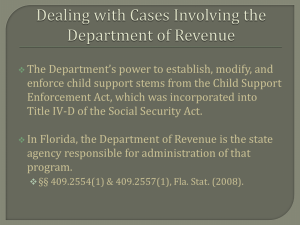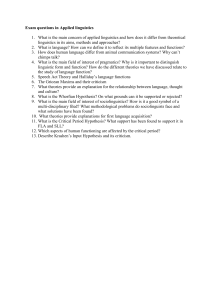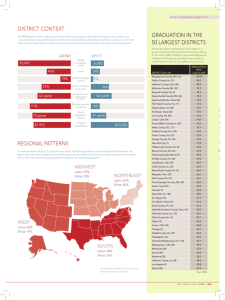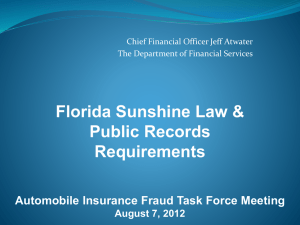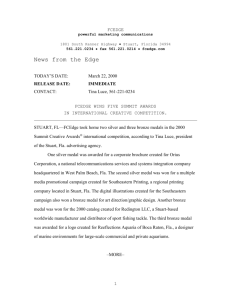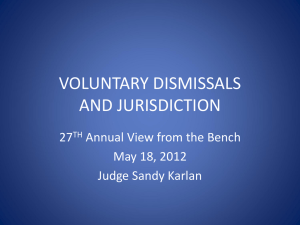PORTFOLIO RECOVERY ASSOCIATES, LLC, Appellant, v_ PAUL
advertisement
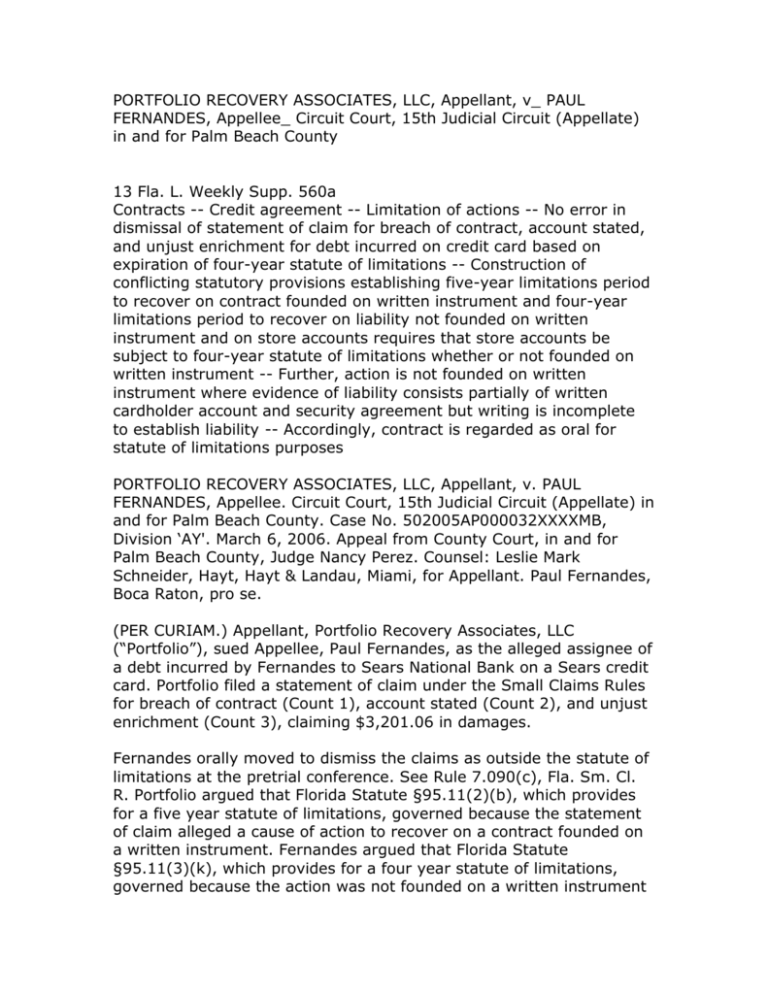
PORTFOLIO RECOVERY ASSOCIATES, LLC, Appellant, v_ PAUL FERNANDES, Appellee_ Circuit Court, 15th Judicial Circuit (Appellate) in and for Palm Beach County 13 Fla. L. Weekly Supp. 560a Contracts -- Credit agreement -- Limitation of actions -- No error in dismissal of statement of claim for breach of contract, account stated, and unjust enrichment for debt incurred on credit card based on expiration of four-year statute of limitations -- Construction of conflicting statutory provisions establishing five-year limitations period to recover on contract founded on written instrument and four-year limitations period to recover on liability not founded on written instrument and on store accounts requires that store accounts be subject to four-year statute of limitations whether or not founded on written instrument -- Further, action is not founded on written instrument where evidence of liability consists partially of written cardholder account and security agreement but writing is incomplete to establish liability -- Accordingly, contract is regarded as oral for statute of limitations purposes PORTFOLIO RECOVERY ASSOCIATES, LLC, Appellant, v. PAUL FERNANDES, Appellee. Circuit Court, 15th Judicial Circuit (Appellate) in and for Palm Beach County. Case No. 502005AP000032XXXXMB, Division ‘AY'. March 6, 2006. Appeal from County Court, in and for Palm Beach County, Judge Nancy Perez. Counsel: Leslie Mark Schneider, Hayt, Hayt & Landau, Miami, for Appellant. Paul Fernandes, Boca Raton, pro se. (PER CURIAM.) Appellant, Portfolio Recovery Associates, LLC (“Portfolio”), sued Appellee, Paul Fernandes, as the alleged assignee of a debt incurred by Fernandes to Sears National Bank on a Sears credit card. Portfolio filed a statement of claim under the Small Claims Rules for breach of contract (Count 1), account stated (Count 2), and unjust enrichment (Count 3), claiming $3,201.06 in damages. Fernandes orally moved to dismiss the claims as outside the statute of limitations at the pretrial conference. See Rule 7.090(c), Fla. Sm. Cl. R. Portfolio argued that Florida Statute §95.11(2)(b), which provides for a five year statute of limitations, governed because the statement of claim alleged a cause of action to recover on a contract founded on a written instrument. Fernandes argued that Florida Statute §95.11(3)(k), which provides for a four year statute of limitations, governed because the action was not founded on a written instrument or was on a store account. The trial court dismissed the case based on its finding that the credit card account was an open account subject to the four year statute of limitations.1 Portfolio argues that the trial court erred when it dismissed the statement of claim based on a finding that the claim was barred by the four year statute of limitations. We disagree.2 An order dismissing a complaint is reviewed de novo. See City of Hollywood v. Petrosino, 864 So.2d 1175 (Fla. 4th DCA 2004). The claim must be taken as true and considered in the light most favorable to the plaintiff, subject to the trial court's ability to summarily dispose of small claims actions if no triable issue exists. See Bryant v. Adventist Health Systems Sunbelt, Inc., 869 So.2d 681 (Fla. 5th DCA 2004); Rule 7.135, Fla. Sm. Cl. R. The nature of the claim, and not the specific form of action selected by a plaintiff to assert it, determines the applicable statute of limitations. See 20 Am. Jur. 2d, Credit Cards, §46 (2005). In Count 1, Portfolio alleged that Fernandes “by execution of the application and/or by use of the credit card, accepted the terms and conditions of the credit card holder agreement” attached as Exhibit A. Attached as Exhibit A was a copy of a document entitled “Sears Credit Card Account Sears Premium Card Account Cardholder Account and Security Agreement.” Section 95.11(2)(b), Fla. Stat., provides that the statute of limitations on actions to recover on a contract founded on a written instrument is five years. Conversely, section 95.11(3)(k), Fla. Stat., provides that the statute of limitations to recover on a contract, obligation or liability not founded on a written instrument and on store accounts is four years. When construing statutes, the specific controls over the general. See Northwest v. Balkany, 727 So. 2d 382 (Fla. 5th DCA 1999). Thus, if a claim arguably falls within two contradictory subsections of the statute, the more specific controls. Even if Count 1 could be deemed an action founded on a written instrument, it can also be deemed an action on a store account. See 20 Am. Jur. 2d, Credit Cards, §46 (2005); Carte Blanche Corporation v. Pappas, 216 So. 2d 917 (La. 2d Cir. 1968).3 Store accounts have been subject to a separate statute of limitations since 1872. Laws of Florida 1872, c. 1869, §10; McClellan's Digest, §10, p. 733. “The provision is for the benefit of those who have stores, and keep goods therein for sale, and sell them, keeping accounts against the purchasers and relying upon their books of accounts in which the articles are charged as evidence in case of controversy,” and applies whether there is an express or implied agreement covering the charges. Saloman v. The Pioneer Co-operative Company, 21 Fla. 374, 385, 1885 WL 1777 (Fla. 1885). The current grammatical structure, which provides for the limitations period on actions “upon a contract . . . not founded upon an instrument of writing, including an action for goods, wares and merchandise sold and delivered, and on store accounts,” has been used since 1919. (emphasis supplied). Laws of Florida 1919, c. 7838, §10, subd.9. “. . . (C)lauses separated by commas are nonrestrictive clauses intended to introduce independent concepts.” Amendments to the Florida Rules of Appellate Procedure, 696 So. 2d 1103, 1108, footnote 6 (Fla. 1996) (Anstead concurring) (quoting brief); see, also, The Elements of Style, Struck and White, 3rd Ed., p. 5 (“(p)lace a comma before a conjunction introducing an independent clause”). Thus store accounts are subject to a four year statute of limitations whether or not founded on a written instrument. See Saloman, supra; Wagner v. Botts, 88 So. 2d 611, 613 (Fla. 1956) (“(h)istorically, parliamentary enactments originally were not punctuated at all. However, the Legislatures of our country have consistently attempted to follow the rules dictated by grammar books with the result that statutes are now punctuated prior to enactment. The better rule now seems to be that punctuation is a part of the Act and that it may be considered in the interpretation of the Act but may not be used to create doubt or to distort or defeat the intention of the Legislature . . . We deem it proper to adhere to what now appears to be the better rule which is to treat the rules of punctuation on a parity with other rules of interpretation.”); Broward Builders Exchange, Inc. v. Goehring, 231 So. 3d 513, 515 (Fla. 1970) (“(i)t cannot now be assumed that the Legislature was unfamiliar with this simple rule of punctuation . . .”). Store accounts, of course, as a species of open accounts, may be based on either a written or oral agreement. See Robert W. Gottfried v. Cole, 454 So. 2d 695 (Fla. 4th DCA 1984); Hawkins v. Barnes, 661 So. 2d 1271 (Fla. 5th DCA 1995). Count 1 alleges that Fernandes bound himself to the terms of the Cardholder Account and Security Agreement either when he executed an application for a Sears card or when he used a Sears card. If the Cardholder Account and Security Agreement alone were introduced into evidence at trial, though, it would not be sufficient to establish Fernandes' liability. See Colorado National Bank of Denver v. Story, 261 Mont. 375, 862 P. 2d 1120 (Mont. 1993). By itself, it created no liability for Fernandes.4 Instead, it addressed the manner in which a liability which might be later created should be discharged.5 If evidence of liability is partially in writing but the writings are incomplete to establish liability, then the contract is regarded as oral for statute of limitations purposes. See ARDC Corporation v. Hogan, 656 So. 2d 1371 (Fla. 4th DCA 1995), rev. den. 666 So. 2d 143 (Fla. 1995); Multi-Line Claims Service, Inc. v. Cumis Insurance Society, Inc., 739 So. 2d 144 (Fla. 3d DCA 1999) (four years statute of limitations for breach of oral contract applied to action on oral contract for adjusting services, though parties agreed to compensation based on a written fee schedule); Johnson v. Harrison Heardware Furniture Co., 119 Fla. 479, 472, 160 So. 878 (1935) (“(t)he writings attached to, relied on, and made a part of, the second amendment to plaintiff's replication do not on their face constitute a contractual acknowledgment of the loan of any money by plaintiff to defendant, which is the thing sued for, therefore such writings per se can avail nothing to plaintiff as a sufficient preclusion of the bar of the threeyear statute of limitations [applicable to actions not founded upon an instrument in writing.] . . .”); Gulf Life Inc. Co. v. Hillsborough County, 129 Fla. 98, 104, 176 So. 72 (1937) (“(i)n order that a contract be founded upon a written instrument, the instrument must contain a contract to do the thing for the nonperformance of which the action is brought.”); Ball v. Roney, 112 Fla. 186, 150 So. 240 (1933); Schrank v. Pearlman, 683 So. 2d 559 (Fla. 3d DCA 1996), rev. den. 691 So. 2d 1081 (Fla. 1997).6 The action is not founded on a written instrument for statute of limitations purposes.7 The legislative scheme makes sense. See Bush v. International Fidelity Ins. Co., 834 So. 2d 212 (Fla. 4th DCA 2002), rev. den. 847 So. 2d 976 (Fla. 2003) (statutory provisions to be given reasonable and logical construction). “. . . (S)tatutes of limitations are designed to prevent undue delay in bringing suit on claims and to suppress fraudulent and stale claims from being asserted, to the surprise of parties or their representatives, when all the proper vouchers and evidence are lost, or the facts have become obscure from the lapse of time or the defective memory or death or removal of [a] witness.” Foremost Properties, Inc. v. Gladman, 100 So. 2d 669, 672 (Fla. 1st DCA 1958), cert. den. 102 So. 2d 728 (Fla. 1958) (citation omitted). A review of the statute shows, consistent with common sense, that those actions on which proof is less likely to deteriorate over time are subject to longer limitations periods; those actions on which proof is more likely to deteriorate because of faulty memory or otherwise are subject to shorter limitations periods. Unlike a written contract containing all the terms sued on, proof of the balance due under a store credit card depends on the correctness of the store's books. We know, though, that record keepers come and go; purchased items are returned or exchanged; and partial payments are made. Proof of the amount due under a store credit card is simply not as secure as proof of the amount due on, for example, a promissory note that contains in writing all the terms of the parties' undertakings. See Nardone v. Reynolds, 333 So. 2d 25, 36 (Fla. 1976), mod. on other grds., Tanner v. Hartog, 618 So. 2d 177 (Fla. 1993) (unfair to allow one who has slept on his rights to sue a party “ ‘. . .who is left to shield himself from liability with nothing more than tattered or faded memories, misplaced or discarded records, and missing or deceased witnesses' ”); Allie v. Ionata, 503 So. 2d 1237 (Fla. 1987). Because Count 1 alleges a claim on a store account; because it does not allege a claim to recover on a contract founded on a written instrument; because under the Small Claims Rules the trial court properly inquired into undisputed facts at the pre-trial conference that would be dispositive of the claims; and because the trial court properly found that the claims raised in Counts 2 and 3 of the statement of claim were likewise subject to a four year limitations period, which Portfolio does not dispute, it is ORDERED AND ADJUDGED that the trial court's judgment is AFFIRMED. (SMITH, MAASS and STERN, JJ., concur.) __________________ 1Apparently the trial court summarily disposed of the statement of claim on being apprised of the last payment date. See Rule 7.135, Fla. Sm. Cl. R. 2On appeal from an order of dismissal an appellate court may consider only issues presented to the trial judge. See Sparta State Bank v. Pape, 477 So. 2d 3 (Fla. 5th DCA 1985). This Court agrees with the trial court's decision to dismiss Counts 2 and 3 of the statement of claim. Neither party has taken issue with the trial court's decision to dismiss those counts. Portfolio concedes its claims are precluded if subject to the four year limitations period. 3Portfolio alleges it is the assignee of Sears National Bank, an affiliate of Sears, Roebuck and Co. See preamble to Cardholder Account and Security Agreement; 12 U.S.C. § 1841(k) (“. . .the term ‘affiliate' means any company that controls, is controlled by, or is under common control with another company.”) Under the Competitive Equality Banking Act of 1987, Sears could own a credit card bank without violating the Bank Holding Company Act of 1956 and thus charge a nationwide uniform rate of interest on credit card sales. See, also, Marquette Nat'l Bank v. First Omaha Serv. Corp., 439 U.S. 299, 99 S. Ct. 540 (1978). 4Portfolio implicitly recognized this when it incorporated elements of a claim for account stated in Count 1. See Paragraphs 8, 9, statement of claim; Merrill-Stevens Dry Dock Co. v. “Corniche Express”, 400 So. 2d 1286 (Fla. 3d DCA 1981). 5No statement of account was attached to the statement of claim. 6The cited cases are distinguishable from those where the written instrument obligated the debtor to purchase defined goods or services and pay for them at a contemporaneously determined or determinable rate. Compare, e.g., McGill v. Cockrell, 88 Fla. 54, 101 So. 199 (1924); Mercy Hospital, Inc. v. Carr, 297 So. 2d 598 (Fla. 3d DCA 1974), cert. den. 307 So. 2d 448 (Fla. 1974). 7For example, assume Smith agrees in writing with Jones that if Jones loans him money Smith will repay it with 10% interest. If Jones later sues Smith claiming Smith borrowed money and did not repay it, whether Smith is liable to Jones is dependent on whether and how much he borrowed. Suit to recover the money loaned is not founded on a written instrument. See Johnson v. Harrison Hardware & Furniture Co., supra. ***
